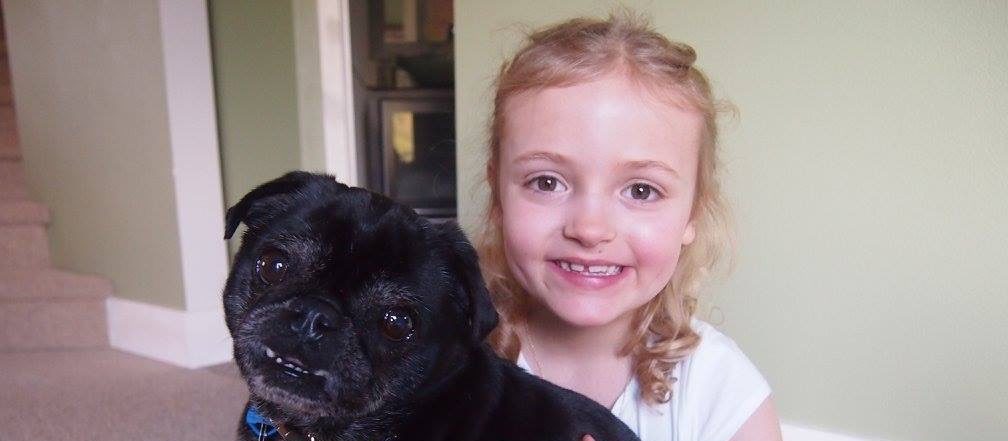My 10-year-old daughter Reagan has experienced a lot of pet loss in the past year. Our 12-year-old black Pug, Willy, died suddenly and unexpectedly while my husband and I were out of the country, leaving Reagan and my mother Teresa to face his loss together. Then my parents’ 16-year-old canine cocktail Quixote passed away.
At those ages, it’s not necessarily a surprise when dogs die, but it’s still a loss for the people who loved them. That’s especially true for children, who may never have come to grips with death before.
For me, part of the grieving process as a mom has been to assist Reagan in her own grieving and healing process. In doing so, I’ve found I’m not only teaching my daughter valuable life lessons that are applicable in so many other areas of her life, but the growing awareness has made me better able to effectively cope and grieve with loss of the animals I love in my own life.
No single approach is best for helping a child through the grief that accompanies the loss of a pet, but as both a mother and animal trainer, I have found certain ways that have helped us walk the path of loss.
Be Honest
From my early memories as a child, I remember some of the worst ‘betrayals’ experienced through the eyes of my childhood cousins and friends were those where the parent lied about where the pet had gone. Because the parents didn’t think their children could handle the truth of a dog’s death, they lied to them, making up stories, such as the dog was adopted, became lost, or was run over. The reality of what had really happened in each case was eventually found out. Not only was the child dealing with the loss of their pet afresh, but they were also dealing with feelings of betrayal and hurt. For me, and for Reagan, transparency has always been important, and such openness has helped us build a relationship founded on trust.
Talk About It
Prior to losing Willy, Reagan had already dealt with the notion of death and loss through the passing of our other Pug, Bruce, in 2015. But even before that, we had read books and watched movies with the theme of loss, allowing us to discuss “what comes next” when a person or pet dies.
For me, being of the Christian faith, our talks included the notion of heaven, where we (and our dogs) would be given a renewed body and soul, and where we’d one day be reunited with those that on earth we’d loved and lost. For Reagan, this foundation of understanding what happens when someone passes, whether person or pet, was preparation that helped her to better deal with loss when it happened.
Be Sensitive to a Child’s Needs
It’s okay to ask a child how she feels about a pet’s death but talking about it too much can intensify feelings of loss and make pain even greater. Reagan appreciated the ability to reflect and grieve alongside us, but after expressing how she felt, she wanted to move forward rather than constantly ruminating on the weight in her heart.
Though she still wants to reflect on Willy from time to time, the memory of his loss is still painful, just as it is for me. For us, it’s best to keep Willy’s memory alive by celebrating the incredible dog he was during our richly blessed emotional life together.
This article was reviewed/edited by board-certified veterinary behaviorist Dr. Kenneth Martin and/or veterinary technician specialist in behavior Debbie Martin, LVT.
Mikkel Becker is the lead animal trainer for Fear Free Pets. She is a certified behavior consultant and trainer who specializes in reward-based training that’s partnered closely with the pet’s veterinary team. Mikkel is the co-author of six books, including From Fearful to Fear Free.








